 If you’re a regular reader of Third Culture Kid Life, you’ve undoubtedly noticed that in my every explanation, I make a constant and overarching effort to emphasize that while TCKs share many different traits, the fact that our community is built out of multiple experiences with different cultures building a third separate culture that combines all other cultures we’ve touched, means that every TCK is truly different from the next. Of course, we are inherently natural adapters, we are listeners, understanders, cultural bridges, mediators, empathizers, and many many many other things, but we are still culturally different from all those who share the TCK title.
If you’re a regular reader of Third Culture Kid Life, you’ve undoubtedly noticed that in my every explanation, I make a constant and overarching effort to emphasize that while TCKs share many different traits, the fact that our community is built out of multiple experiences with different cultures building a third separate culture that combines all other cultures we’ve touched, means that every TCK is truly different from the next. Of course, we are inherently natural adapters, we are listeners, understanders, cultural bridges, mediators, empathizers, and many many many other things, but we are still culturally different from all those who share the TCK title.
Oddly enough, that doesn’t change our connection. The ability we have to merge and adapt, to absorb the elements of our surrounding at a level First Culture Kids can’t even begin to understand, gives us a level of separation from other cultures that only fellow TCKs truly understand. It’s that natural adaptation level that brings us together and forms our unity with other TCKs.
But what is it that, fundamentally, defines us as Third Culture Kids? It’s not the culture we have created, or at least not the gritty details of that culture. It’s instead the grand idea that we are adapters, trained to absorb from such a young age, and trained so well that our ability is so completely natural that we don’t even realize we’re doing it.
I’ve said all this before, though. Many, many times, in different ways for different ears. And when I talk, I’m met with combinations of understanding, reiteration, support, and confusion. I’m related to the words of other TCK specialists, asked if my definition of a Domestic TCK is the same as David Pollock’s “Hidden Immigrant,” or if my Expat TCK is just a normal developing Third Culture Kid.
However, like all theories and ideas, my take on these items are an expansion of a system that has long since been under construction. One word, one idea, one hypothesis doesn’t build a theory. Testing, growth, and evolution build a theory. A constant eye on the changes that take place, the removals of constants, the additions of anomalies. All of these things, constantly documented, constantly noted, are what make a theory strong. These ideas, while based on the works of some very talented professionals and a combination of personal experiences and interviews with other TCKs, are the next layer of bricks in a tower of understanding.
Unfortunately, this doesn’t halt the questions regarding what it all means, or how you define a TCK, or how you can identify an FCK over a TCK with just a few quick questions. What experiences make you a Third Culture Kid? Some books say it requires international isolation, others say it can be adopted in a home culture, and even more put ridiculous restrictions onto the term to make it some sort of elite separation from society.
Well, I’ll tell you what. How about I just take the time to do what I should have done a long time ago. How about I map it out the way this collection, the way my experiences in the real world and the experiences of my fellow TCKs like to explain the entire thing. Except this time, I’ll do it with pictures, and I’ll do it in a way that is similar to how it was shown to me so many years ago.
So, here’s the world. If you were to take the planet, cut from north to south, unball it, then flatten it out, it would look something like this (just image how annoyed everyone would be if we actually did that…):
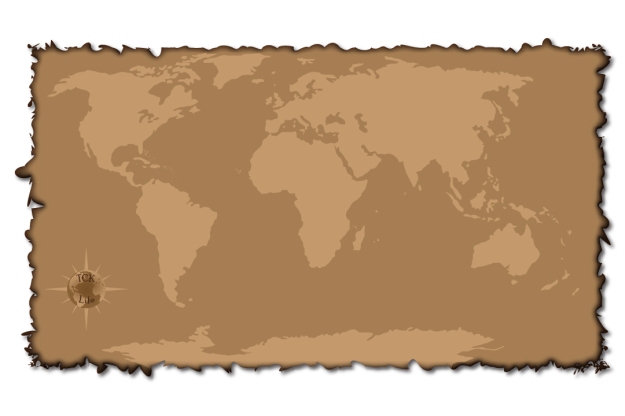 Of course, if anyone is reading this in a billion years, please disregard this map. It is clearly very wrong thanks to plate tectonics, but that’s a whole different lesson that doesn’t apply here. Besides, I’m not really writing this for you future people, I’m writing it for people of the early 21st century.
Of course, if anyone is reading this in a billion years, please disregard this map. It is clearly very wrong thanks to plate tectonics, but that’s a whole different lesson that doesn’t apply here. Besides, I’m not really writing this for you future people, I’m writing it for people of the early 21st century.
The way we’ve set up the world right now, that map is broken up into one-hundred and ninety-blahdnaf countries. Different countries recognize different states of existence, and some countries don’t recognize others at all. Then there’s countries other countries have just made up for the sake of making a country, like Iran where a bunch of guys went “You know what, everyone shut up, this is called Iran and I want to hear nothing else about it!” And that was that. Poof. Iran. Sure it may have been a bit more complicated than that, but you get the idea. Countries are hard to put a number on. We’ll go with 196. That gives us a little protection with 193 in the United Nations and some extras floating around that a lot of people don’t want to recognize.
So, these countries, they have culture. People rally behind this cultural belief called Patriotism. It’s a large, broad, and difficult to define culture. But it’s a part of a culture, for sure. So here’s what that looks like:
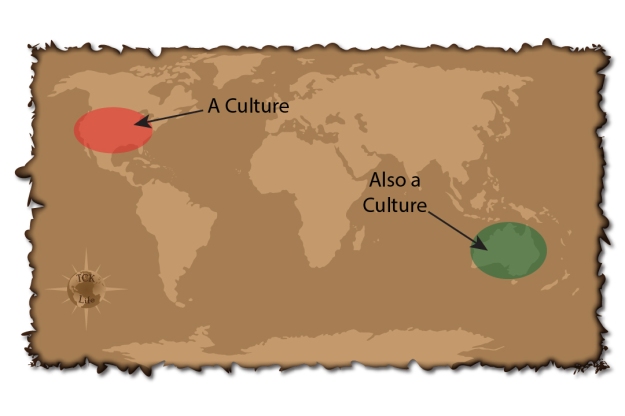 The United States has a culture. Australia has a culture. So do all the other countries, but that’s 196 shapes to draw, and to be honest, I’m not that patient of a person. I mean I’m not even really covering the countries properly. All the people living in Perth aren’t part of Australia’s culture according to this map. Sorry, Perth. I think you’re a lovely place, and I didn’t mean to exclude you.
The United States has a culture. Australia has a culture. So do all the other countries, but that’s 196 shapes to draw, and to be honest, I’m not that patient of a person. I mean I’m not even really covering the countries properly. All the people living in Perth aren’t part of Australia’s culture according to this map. Sorry, Perth. I think you’re a lovely place, and I didn’t mean to exclude you.
Within that country culture, though, you have countless sub cultures. Each pocket of space isolated by distance and time, locked into tiny spheres of influence within a greater cultural mask. That looks sort of like this:
All these subcultures are inseted into the greater culture, overlapping on the grander cultural idea, but each one depicting its own ideas. And yet in those subcultures, each subculture overlaps into yet another subculture, making it uniquely different from the subculture that shares similar ideas because it is influenced by the cultures surrounding it.
Of course, this continues to go deeper for what feels like an infinite amount, isolating culture after culture into pockets of thousands, then hundreds, then tens, all the way down to the single cultural experience of an individual person who has been impacted by the cultures around them.
The question is, what does this have to do with being a Third Culture Kid? Well, it starts with the culture of your family, like so:
This culture, the culture of your parents, your grandparents, your cousins, your uncles, your aunts, and anyone else who grew up and evolved along a very similar cultural thread, is shaped entirely by the people you were bread into unity with. This is the first culture, not to be confused with the First Culture (notice the capitals). This first group, the family group, followed one developmental path, a single childhood cultural experience impacted minimally by the cultures of others, isolated and strong in its cultural beliefs. One culture, which is incidentally the definition of the The First Culture.
Then, you move. Once, twice, ten, twenty times. You leave the security of the individual First Culture, taking your family with you, at least your parents, but now you’re somewhere different. You’re in a different country surrounded by different people. While your parents are set into their own beliefs, locked into their cultural levels already, they’ll still experience a little bit of cultural melding. This is normal. Everyone does it in expatriate life. And that culture ever so slightly crosses into theirs. This is the second culture, or your Travel culture. It looks like this:
Now we’ve got two cultures that are slightly overlapping, but for the main part, completely independent of each other. But these aren’t the sole forces in your life. We have teachers in these foreign worlds, acquaintances, strangers on the street, and most of all, friends. We have friends from varying other social backgrounds, all with different cultures, all with different understandings of the world. So we must add in what we will call your friends, a third culture:
This is the single difference between you and your expatriate family. They can adapt and adjust, but they can never build the person they are like a child can, like you did as you grew up, by absorbing all of these cultures. You are building a personality, a future, who you are, when all of these things are already locked into your parents’ brains. They can adjust, add in new elements, but you, as young as you are, are a clean slate ready to have the information of the world inscribed upon it. And that’s where the magic happens to create that mysterious Third Culture. It happens right here, in the middle of it all:
There it is. The Third Culture Kid hybrid of creativity. It’s how we all came to be, one way or another, through different families, travels, and friends. But in the end, we all fall right there in the middle, an odd hybrid of everything we’ve picked up along the way. That’s the mysterious zone that our parents, our friends, and the people in the countries of our past can’t understand. Because while we are built out of the elements of each of them, we are not explicitly them. We are more. We are a combination, leaving behind massive chunks and taking on the pieces we want and need.
And that, in the simplest way I can imagine to explain it, is who we are and how we came to be. Many of my TCK readers know this already, and some will have wonderful further insights into the ongoing development of this idea. But here’s the baseline blueprint for the families that are building TCKs today. This is what will happen. This is what will make your child a Third Culture Kid.
___________
- Post by: James R. Mitchener

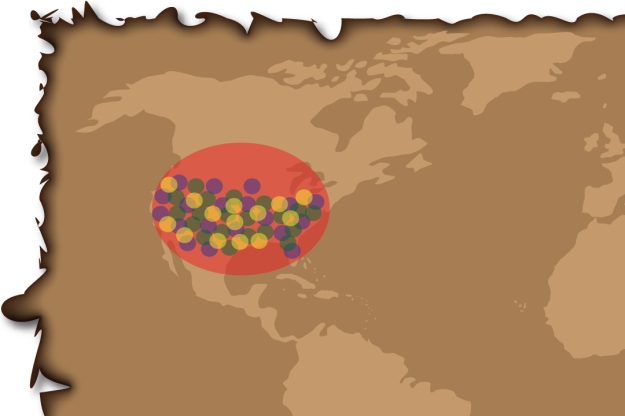
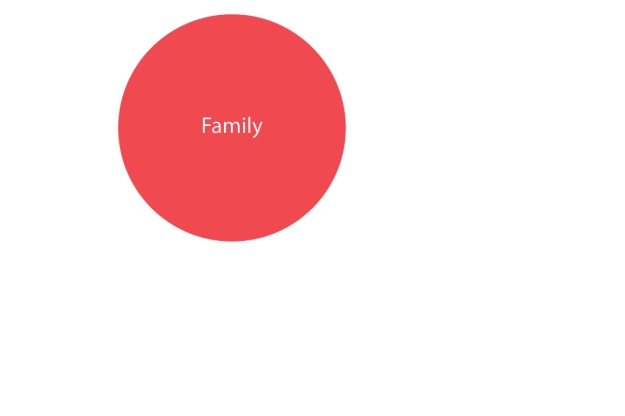
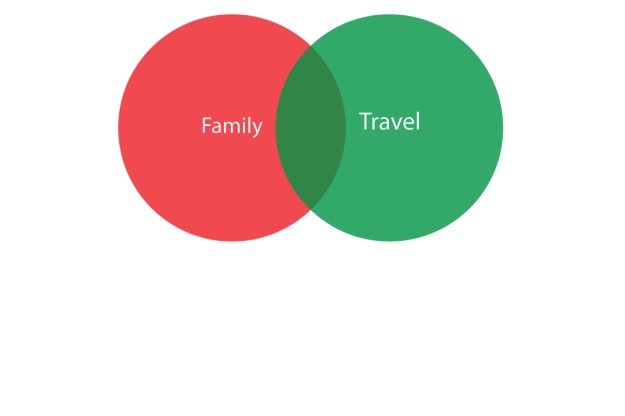
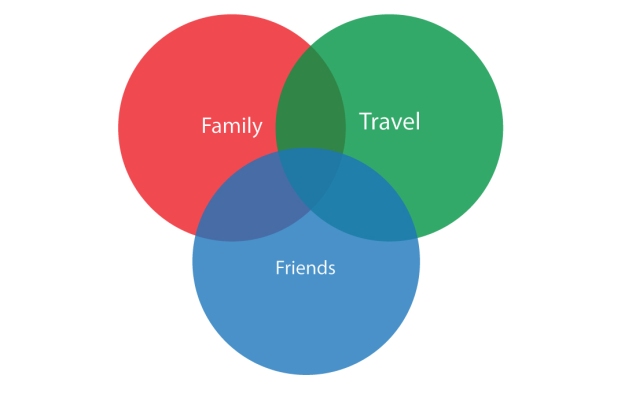
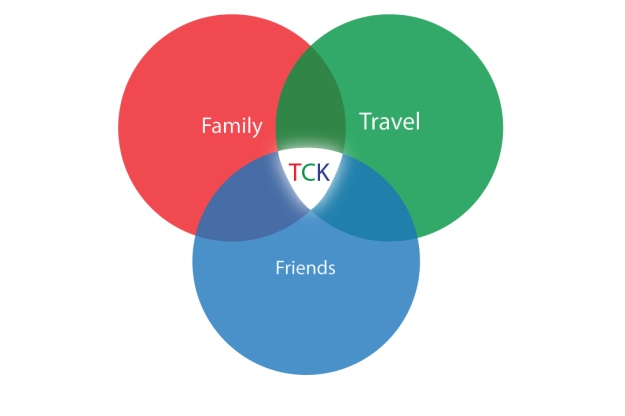

James, this is brilliant! Thank you so much for putting in words what I was – poorly – trying to set up for a post. I completely agree that we are a combination of all the elements you’ve mentioned. And we are very unique combinations, because even if we share the same experiences (family, travels, friends) with others – with our siblings for example – we make our very individual choices about the pieces we want and need.
Very good article!!!!! You help me a lot understanding the way I grew up… My parents never told me all these things and don’t even know that they brought me up as a TCK…. It’s a good feeling to finally understand who I am and what my personality is made of. THANKS!!
Pingback: Review: “The Illusive Home” by James R. Mitchener « expatsincebirth
I am so glad that I stumbled upon your blog a few months ago. I have come back several times and re-read various posts. As a TCK in my late 30s I had never actually thought about what I was or how it was affecting my life choices, perspective, etc until recently when an old friend sent a silly article with animated gifs, “You know you’re a TCK when…” and I started googling the term. I too struggle with ‘dark clouds’ and many other issues you have discussed, while also loving the crazy adventure I call my life. Plus, as one of four siblings, each of us have processed the experience and reacted in extremely different ways, to the extent that people actually struggle to believe we are related. The path of a TCK is totally unique.
I have now been in one city for 8 years, more than double the length of time in any other location and I realised that my ‘restless feet’ are causing me internal strife again. 8 years, not much for others, an eternity for me and I feel thwarted and suffocated despite having a good life and great friends. BUT they are all non-TCKs and I have been playacting at being a non-TCK for so long I almost forgot myself. Thankfully, I have kept in touch with a number of my TCK friends but they are so very far away and are busy with their owns lives and families. I will keep reading your blog as I try to figure out how to quiet that voice that screams in my head to get on the next plane and start all over again. Fingers crossed….
Just wondering how its going…. I am in the same boat…now 10 years in the same spot and wondering how much longer I can go without getting on some serious meds! The internal battles are brutal but I have children and dont want to repeat the cycle. Travelling does help….although there is still that voice that there is somewhere else I need to be!
Unfortunately, no. I had a complete breakdown and had to take two months off work recently and was on various meds which just made me feel worse. The therapist said I was the most interesting case she ever had and looked forward to our sessions each week because my life was like a ‘cliffhanger’. I said, “try living it”. I no longer bother to go, it wasn’t helping. After exhausting all other options I now go to see a Reflexologist and get acupuncture. Some days are good and some days are bad but I never stop thinking about leaving. Ever. I have a kid too, which is why I am forcing myself to stay but it’s slowly killing me.
My friend, I am so terribly sorry that I have been such an awful host and writer of this collection. I so infrequently come back to old posts to view the writings of the past, and in the process I miss moments like this, the reasons I write this collection in the first place, and that is completely inexcusable on my part.
I want you to know you are not alone. Your feelings of being stranded, the knowledge that surrounded by FCKs you are never yourself. that what makes you who you are is locked into a world of travel. But I also want you to know that the community is here for you. You should join us on the first and third Wednesday on #TCKchat on twitter, where you’ll meet dozens of TCKs who have experiences that range across the entire spectrum, all of whom are amazing resources. And of course, if you ever need to talk, I welcome you to email me personally at james@thirdculturekidlife.com.
Just remember, you are not alone, and there are so many of us who would love to talk about absolutely anything with a fellow TCK.
-James R. Mitchener
Pingback: I’m Not WHITE!? WHAT!?: White American Culture | Mily
Pingback: TCKid 2013 Year in Review « News TCKID